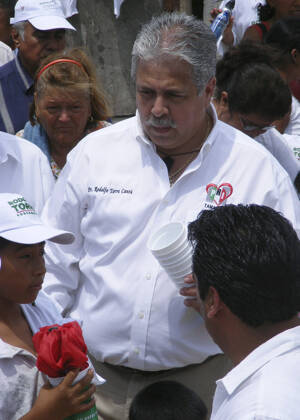Catholic leaders condemned the June 28 assassination of a gubernatorial candidate in the northeastern Mexican state of Tamaulipas, where elections are scheduled for July 4 in an atmosphere of violence linked to warring narcotics-trafficking cartels. Gubernatorial front-runner Rodolfo Torre Cantu was gunned down along with four others as their campaign convoy traveled to the airport in Ciudad Victoria, 200 miles south of the Texas border at McAllen. Torre, a physician and candidate for the locally powerful Institutional Revolutionary Party, led all polls for the election in Tamaulipas, which has become one of Mexico's most violent states.
"This crime ... threatens the core values and freedoms of all Mexicans such as democracy and is therefore doubly condemnable," the Mexico City Archdiocese said in a June 28 statement. "This act of violence attempts to rob Mexico of its dignity and desire for transparency, pluralism, freedom and ability to overcome."
The murder casts a further pall over the gubernatorial elections in 12 states, which have been marred by allegations of local governments using social programs for coercive get-out-the-vote schemes and suspicions that organized crime leaders might attempt to corrupt or disrupt the electoral process. In Tamaulipas, one mayoral candidate already was shot dead, while opposition parties reported difficulties finding candidates to run for public office. Many mayors in cities bordering the Rio Grande Valley of Texas reportedly live in the United States and commute to work in Mexico.
Violence has been widespread because the state is a key transit point for exporting drugs and importing weapons. The violence has escalated of late as several cartels have reportedly sent toughs to Tamaulipas to exterminate Los Zetas, a notorious group of ex-soldiers who previously were the armed wing of the local Gulf Cartel. Some church officials preferred not to comment on the situation or provide their names.
"There's fear ... it's gripping all of the state ... that's all I can say," said a spokesman for the Dioceses of Tampico, which includes an area where 20 bodies from a massacre were discovered June 11. "It's a time in which we have to trust in God," the spokesman added.
Father Alan Camargo, spokesman for the Matamoros Diocese, said "social psychosis" had taken hold in Tamaulipas. The state has recorded at least 300 deaths in 2010, according to media reports. The vote will continue, state electoral authorities said. Catholic officials urged residents to vote. Father Camargo, whose diocese borders Brownsville, Texas, said the same violence impacts the church, too. Archbishop Christophe Pierre, apostolic nuncio to Mexico, postponed a visit to the state until October because of security concerns. Parishes in many dioceses have altered Mass times to avoid celebrating the liturgy after dark.
"It's a situation that is surpassing the authorities," Father Camargo said.








